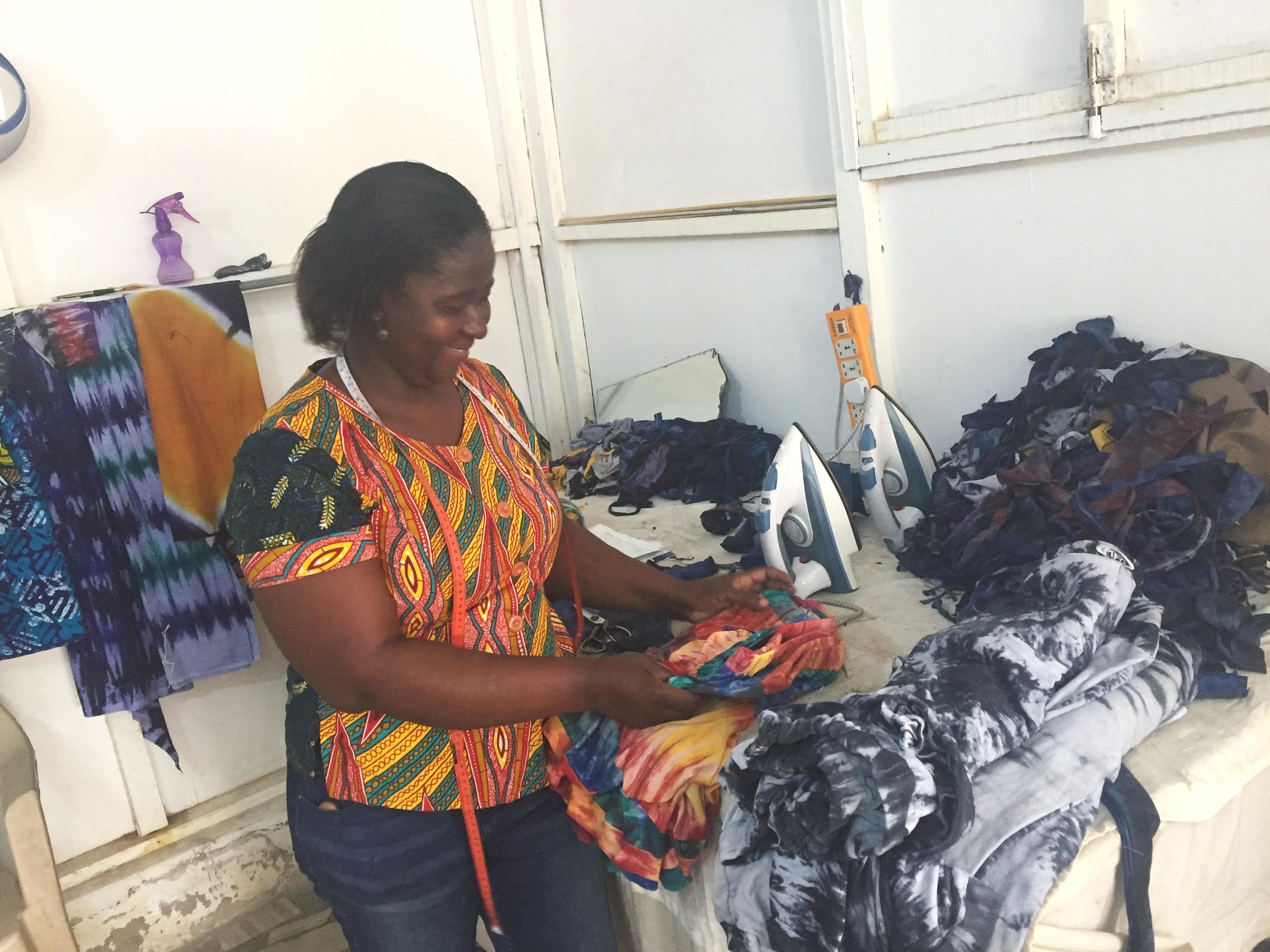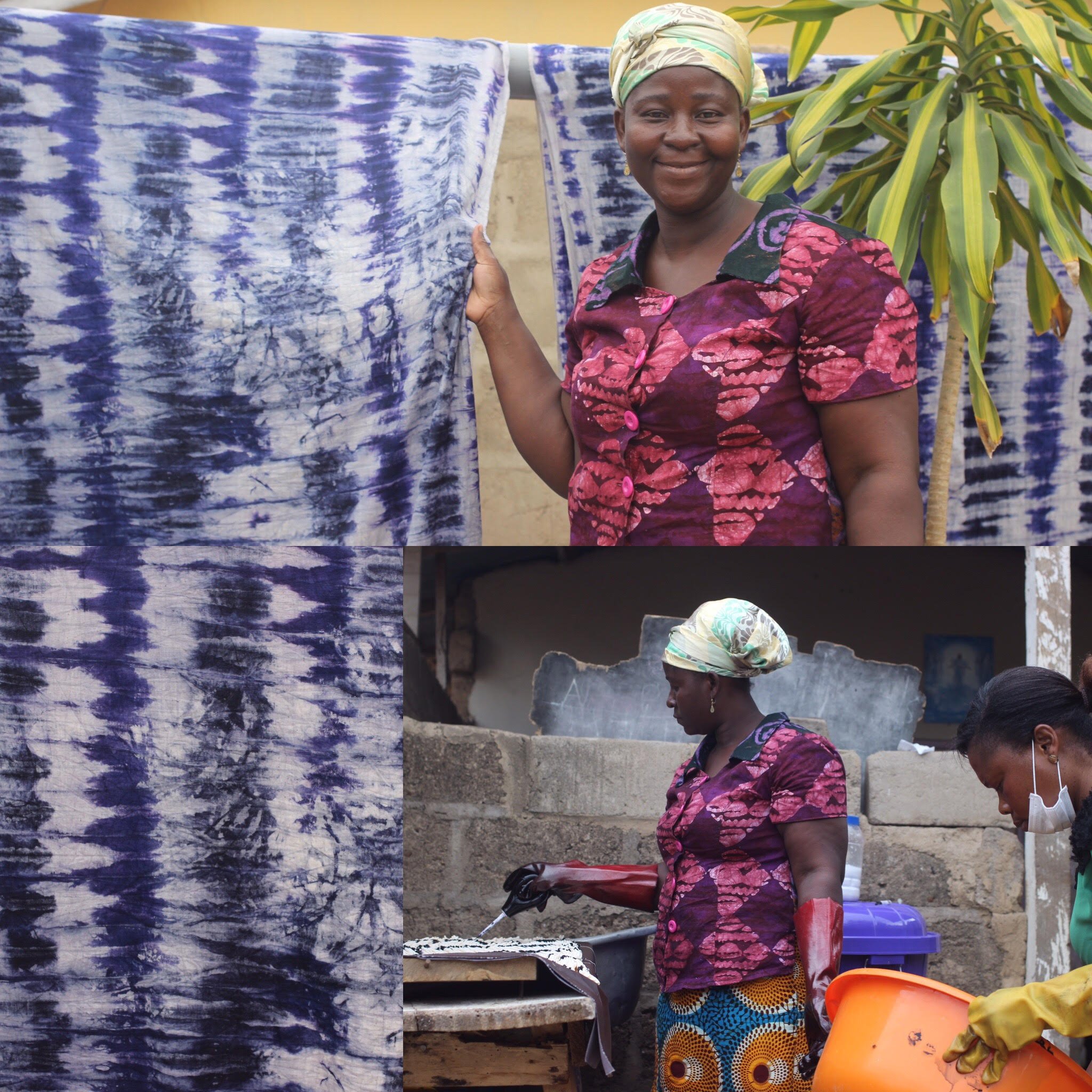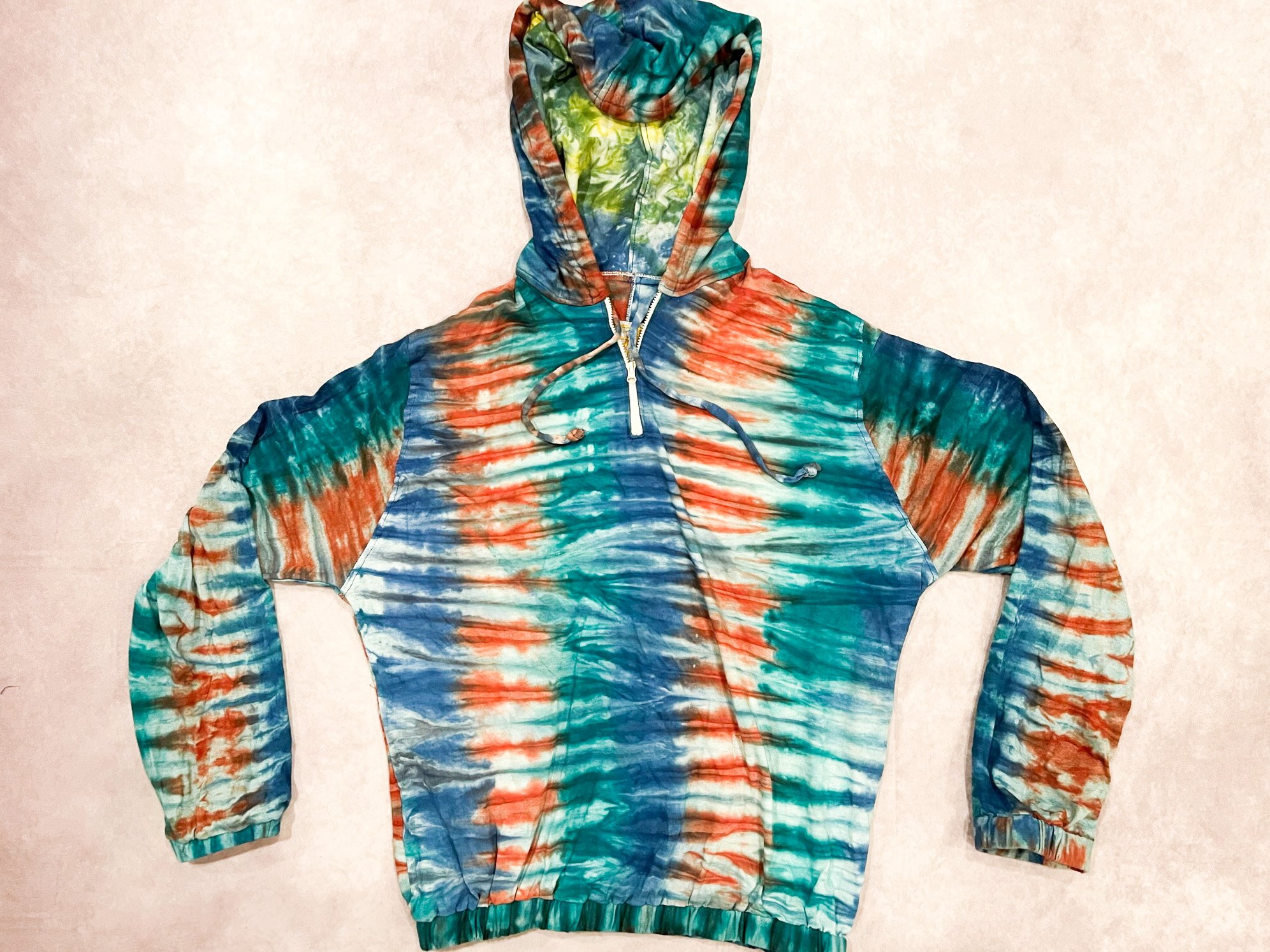MFC Tie-Dye (Make Fashion Clean) Upcycled Denim and Tie-Dye Clothes, Bags and Accessories
May 2016 to Present
Artistic Collaboration
Project Information:
Links
Read an interview I did in February 2024 about MFC’s journey and growth
Description
MFC is a 501c3 non-profit organization whose mission is to reduce global fashion pollution by upcycling textile waste and educating about pollution. MFC creates repurposed denim and tie-dye products out of textile waste sent to Ghana from the Global North in partnership with a non-profit community-based organization in Greater Accra, Ghana called The Matilda Flow Inclusion Foundation (The MFI Foundation). This upcycling partnership generates employment and job training in the creative economy for artisans who have been displaced by the global fast fashion and secondhand clothing industries. It also diverts textile waste from landfills, open-air dumps, and the environment to reduce the impacts of pollution. MFC also collaborates with the The Aftermath Learning Lab on research and art projects at the intersection of textile-related pollution, policy, education, environment, and health.
Role:
I was involved in co-founding MFC in 2016 to 2017 alongside co-founders Dr. Julia DeVoy and Sarah Bibbey in partnership with the founder of the MFI Foundation Matilda Lartey. I was on-site during the founding of The MFI Foundation. Matilda and I developed a close creative partnership during my approximately two years living in Ghana (as an undergraduate student and returning right after college), and this relationship is now more than a decade old.
The MFC project started as a small sustainable fashion collaboration but over the last 7+ years has evolved into something larger as the team and partners collectively discovered the extent to which this project was a locally-generated response to larger systems of waste colonialism. Today, MFC is working towards a vision of not existing in its current form by 2027 to achieve the MFI Foundation’s goals around independence, growth, and sustainability through selling its products to other brands and companies internationally. As of 2024, both MFC and the MFI Foundation are governed by larger boards. MFC’s board is a collaboration of educators, researchers, sustainability experts, and designers primarily based in the United States. They govern MFC via 2-5 hours per week of donated volunteer time. The MFI Foundation’s board consists of activists, educators, and artisans located in Greater Accra, Ghana.
My role with MFC has taken many forms over the years as the project has continued to evolve and grow. My current role is as a volunteer part-time project coordinator and non-voting board member. It involves assisting with project management, reporting requirements, strategic planning, contributing my own funds, contributing to fundraising efforts, and grant deveopment.
Project Positionality Statement
I have continued to reflect on my positionality in this project as a white settler and American since 2016 and have taken a number of different roles over the years. Today, my role as a project coordinator and non-voting board member is grounded in 3 principles, which I am sharing here for the purpose of transparency.
First, I believe that the future leaders of the world and the solutions to the climate crisis are largely located in the Global South. For this reason, I think it is important for U.S. based researchers, activists, and other stakeholders to engage with leaders from the Global South and shift resources and decision-making power to these leaders. I feel it is a misguided response to the histories and on-going harm caused by the engagement of U.S. stakeholders in the Global South to cease engagement. Instead, my personal perspective is that there needs to be ongoing learning and more equitable forms of engagement that meaningfully shift resources and power.
Second, I believe in progress over perfection and ongoing improvement. I believe that many individual behaviors are reflections of the imperialist and white supremacist systems in which we live — and thus need to be actively unlearned. Thus, I try to focus on taking feedback (and encouraging others who I work with to do the same) as an opportunity to learn/unlearn, grow, and take responsive action rather than a personal attack on my/their character or work.
Third, I am committed to seeing all relevant parts of the MFC project fully turned over to The MFI Foundation in line with our original vision, and our focus as team from 2024 to 2027 is on contributing to the necessary infrastructure and partnerships for this to happen. There are many structural obstacles to doing this related to shipping, financial barriers with sending money to Ghana, disinvestment in the creative economy by the global community, and other issues that our team is working to address collaboratively with The MFI Foundation and other stakeholders. Many important improvements to the project occurred in 2018 to 2020, as we grew our team and made the decision to pivot the U.S. portion of the project to a focus on issues of waste colonialism. Once we finish our work to solve the remaining barriers and challenges, I believe our project will have achieved its decade-long vision, and The MFI Foundation will go on to thrive without MFC.
Coverage & Related Content:
5-Year Reflection After the Innovate@BU Summer Accelerator with Dielle Lundberg of Make Fashion Clean (MFC), an interview I did about MFC’s journey in February 2024
Optimize 2023 Holiday Gift Guide Featuring MFC Upcycled Tie-Dye and Denim Products and the MFC Etsy Store in December 2023
Six Quotes from BU Entrepreneurs to Ignite Your Innovative Spirit by Kat J. McAlpine in March 2019. This article quotes me as saying “Innovation isn’t just about selling products. Around the globe, it’s about connecting people that wouldn’t otherwise work together” and “People often donate with the goal of recycling, but the overall impact is negative. We call it ‘denim dumping”.
Project Photos:
Image Description: An upcycled MFC tie-dye sweatshirt in blue, green, and red striped colors on a solid background. Photography by Dielle Lundberg
Image Description: An upcycled MFC tie-dye backpack in rainbow striped colors on a solid white background on a model whose back is turned away from the camera.
Image Description: Dielle modeling the MFC Blue Circle Bag — an upcycled denim circular handbag — in front of a dry northern Arizona landscape.
Image Description: Matilda Lartey — a fashion designer and community activist and the founder of the MFI Foundation — designing and measuring upcycled fabrics. She is standing in front of a table where several stacks of different types of colorful tie-dye materials are located.
Image Description: An blue and green MFC tie-dye sweater hanging on a rack at a small business in Washington, United States
Image Description: An MFC tie-dye sweatshirt in orange, purple, red, and yellow colors on a solid white background on a model whose is faced toward the camera.
Image Description: Dielle — then using they/them pronouns — with Matilda Lartey, the founder and director of the MFI Foundation, and her daughter Ruby Mensah, who is also an artisan and designer, at the opening of the MFI Foundation studio in Ghana in 2016.
Image Description: Matilda Lartey — a fashion designer and community activist and the founder of the MFI Foundation — collaborating with other designers and artisans at the MFI Foundation to produce tie-dye fabrics.







